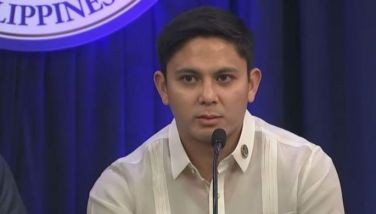Pinay drug mule gets 17 years
HONG KONG – A Filipina tourist was sentenced here yesterday to 17 years imprisonment for bringing in close to three kilos of illegal drugs in May last year.
Analyn Ingalla, 31, admitted that she brought in 2.91 kilos of methamphetamine hydrochloride or shabu while in transit to Vietnam.
Judge Alan Wright gave Ingalla a one-third discount on the prison term for her guilty plea. He imposed 24 years imprisonment as starting point for the charge and added two years for illegal drugs with a street value of more than HK$2 million.
“This is a substantial quantity of drugs, very close to three kilos of ice, so there will be substantial starting point. Whether it was destined for Vietnam or Hong Kong does not make a difference in the sentence,” Wright said.
Ingalla, who had been working as pre-school teacher in Thailand since 2005, admitted that she acted as drug courier for another Filipina whom she met online. She said she was promised $3,000 for the drug delivery.
Through her lawyer, Ingalla told the court that she needed money for the hospital bills – amounting to P500,000 – of her mother who had suffered a stroke.
Four other Filipino tourists will face the High Court this year for allegedly bringing in illegal drugs last year.
Among them is Janric Domingo, who was arrested last July for carrying 5.18 kilos of heroine. He picked up the illegal drugs in Vietnam and was in transit to Shenzhen when arrested at the airport.
Another Filipino tourist, Lolito Balila, was arrested for carrying around 26 kilos of heroin in August last year. From Manila, he went to Malaysia to pick up the prohibited drugs. He then went to Vietnam then came here en route to Guangzhou, where he was supposed to bring the drugs.
Bernard Garcia, meanwhile, was charged for bringing in 19.67 kilos of drug mixture, including 7.95 kilos of heroine.
Another Filipina tourist who came here from Malaysia was arrested in November last year also for drug trafficking.
Hearing on OFW’s bid for permanent residency rights ends
As this developed, the Court of Appeal here ended yesterday its three-day hearing into a Filipino domestic helper’s bid for permanent residency rights.
Chief Judge Andrew Cheung and judges Robert Tang and Frank Stock, however, reserved their judgment on the case.
Evangeline Vallejos, who first came to Hong Kong to work as a domestic helper in 1986, won her petition for right of abode at the Court of First Instance last September.
Justice Johnson Lam had ruled that in excluding foreign domestic helpers (FDH) from the constitutional right to permanent residency, the Immigration Ordinance was “inconsistent” with the Basic Law, the city’s mini constitution.
The Basic Law states that permanent residents include “persons not of Chinese nationality who have entered Hong Kong with valid travel documents, have ordinarily resided in Hong Kong for a continuous period of not less than seven years, and have taken Hong Kong as their place of permanent residence.”
The Immigration Ordinance, on the other hand, states “a person shall not be treated as ordinary resident in Hong Kong while employed as a domestic helper who is from outside Hong Kong.”
In seeking to reverse the Court of First Instance ruling, government lawyer David Pannick said the legislature holds the power to define and refine provisions in the Basic Law and exclude certain groups of persons such as FDHs in the category of ordinary residents.
He added that defining the concept of ordinary residence bears “enormous social and economic importance” in Hong Kong.
Pannick said there are around 285,000 FDHs as of 2010, of whom some 117,000 have been working in Hong Kong for at least seven years.
“There are a lot of people that would potentially be affected by this. The consequences that would apply to an FDH to be treated as permanent resident are: they are to enjoy eligibility benefits, take up other forms of employment and bring dependents,” Pannick said.
The government earlier said allowing FDHs to apply for permanent residency and bring dependents would mean around 400,000 additional permanent residents. Some local politicians had feared that there would be half a million additional residents, who will drain the city’s resources.
Vallejos’ lawyer Gladys Li, for her part, said the figures of the government were “pure speculation.” She said that even if FDHs would be allowed to become permanent residents, bringing in their dependents is not an automatic privilege.
“Why single out foreign domestic helpers as the Immigration Ordinance provision does? It’s just a category of employment. How is that compatible in the least way with all categories of employment?” Li said.
“We are not talking about granting them unconditional stay. We are talking about letting them see whether they qualify for permanent residence,” she added.
Pannick said the conditions of stay on FDHs are also different from other foreign workers who are allowed to apply for right of abode. He cited the live-in arrangement with employer which effectively prohibits them from establishing an independent household; enforced return to the country of origin after the end of a two-year contract; and ineligibility to bring dependents.
“It’s very difficult to regard the circumstances of the life of FDHs other than extraordinary. FDHs retain links with their home country and do not become part of the ordinary society of Hong Kong,” Pannick said.
- Latest
- Trending





























